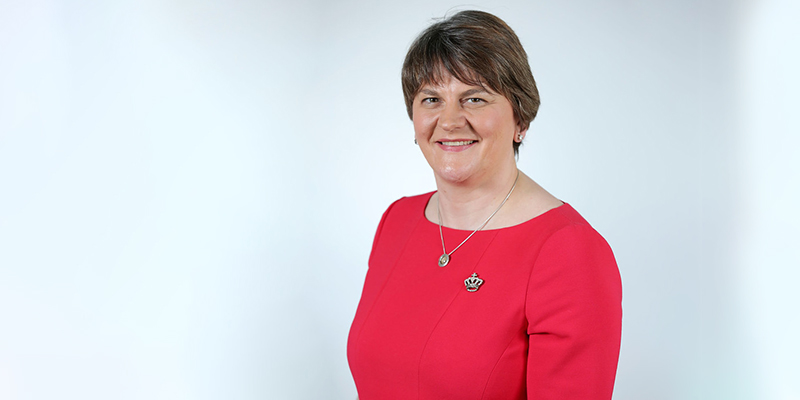
Former NI First Minister condemns Bill that would criminalise parents and Christians
Last Friday, former First Minister of Northern Ireland Baroness Foster of Aghadrumsee spoke in the House of Lords debate on Baroness Burt’s Private Member’s Bill.
The Bill was described as tackling ‘conversion therapy’, but members across the House expressed frustration that it actually posed a risk to innocent Christians, parents and medical professionals.
There is no evidence that any abuse of LGBT people remains legal in the UK, where strong protections exist for everyone. Practices that cause genuine harm have already been outlawed. Instead, leading campaigners for this legislation say it ought to restrict “private prayers” and “casual conversations”.
Legal advice on the Bill described how the ordinary work of churches is at risk, including prayers and pastoral care of anyone struggling with their gender or sexuality. Parents could be found guilty and given unlimited fines, if they do not unquestioningly affirm their child’s gender or sexual identity.
Now a non-affiliated member of the House of Lords, Former First Minister Arlene Foster explained:
“…There is a danger that this Bill will create a new orthodoxy and a whole category of opinions that must not be uttered, at the risk of criminal conviction. Supporters of a new law in this area have urged the UK to imitate the legislation in Victoria, Australia: the Change or Suppression (Conversion) Practices Prohibition Act—the same terms that are found in the Bill before us."
Describing the effect of similar legislation in the Australian state of Victoria, she said:
“One of the enforcement agencies—yes, enforcement agencies—in Victoria is the Equal Opportunity and Human Rights Commission. Its list of what is considered illegal under the Act includes: ‘a parent … refusing to support their child’s request for’ puberty blockers. It also says that ‘not affirming someone’s gender identity’ is an illegal practice. Press reports say that parents of gender-confused children are holding clandestine meetings, living in fear of prosecution for trying to get help for their children.
“The Victoria commission has even issued guidance on how to pray. It says that prayers that talk about a person’s ‘need to repent’ are likely to be illegal."
She continued:
“Apparently, that is what supporters of the Bill want here too. The co-founder of the Ban Conversion Therapy campaign, Jayne Ozanne, says a ban must cover “gentle, non-coercive prayer”. Another founder, Matthew Hyndman, says it must tackle the “pernicious power of prayer”. I was reflecting on that very offensive phrase when I came home from Holy Communion on Sunday, where those present heard the invitation from my minister:
“’Ye that do truly and earnestly repent you of your sins, and are in love and charity with your neighbours, and intend to lead a new life, following the commandments of God, and walking from henceforth in his holy ways’.
“I thought to myself, is that going to be allowed under this new conversion therapy Bill?
“One of the central tenets of Christianity is the need to repent. That is universal; it applies to us all. Is that now going to be challenged or likely to be illegal, as the Victoria commission said? I find that very chilling indeed.”
Other Northern Irish Peers also took part in the debate. The DUP’s Lord Morrow said:
“Most of us know that physically abusive behaviour of every kind is already outlawed by existing legislation, and the Bill says nothing whatever about physical abuse, so that is not what it is targeting. What we are discussing is making criminals out of people for what they actually say."
He explained how the Bill would target mere “assumptions”:
“The subjects of these soon-to-be criminalised assumptions are sexual orientation and gender identity. If you think it preferable for a person to identify as their biological sex, that is the kind of assumption the Bill is targeting. If you hold to historic orthodox Christian teachings on sexual ethics, that seems to be the kind of assumption the Bill is actually targeting.”
Baroness O’Loan, a crossbench Peer and former Police Ombudsman for Northern Ireland, also opposed the Bill:
“…In the context of the Bill, we need to ensure too that our statutory rights to freedom of speech, expression, belief, and so on, are not unnecessarily or disproportionately reduced. It is most important that people are protected from abuse or force, but that does not mean that we cannot say something which may trigger someone or cause them distress. In law, part of our lived experience is the process of acquiring resilience so that we are not inhibited by things that are said to us even when they offend, shock or disturb. It is a criminal offence to use threatening or abusive words likely to cause harassment, alarm and distress anywhere other than in a private dwelling. Coercive behaviour is a criminal offence in an intimate or family relationship. Therein lies statutory protection.
“There will be those who have beliefs and values, whether or not they belong to particular churches, and want to understand their gender identity in this context or to live in conformity with their values or church’s teachings. They may seek spiritual guidance and help. Legislation must make space for that.
“…The Bill is insufficiently precise. It will criminalise people and impose unlimited fines because, in one way or another, without coercive or physically abusive therapy, they have sought to help someone else.”
See also: The ‘jellyfish’ let loose in the House of Lords
Sign up to the Let Us Pray campaign for regular updates - join the campaign.
Sex Matters responds to Stonewall’s ludicrous “conversion” claims
2025-05-14 07:17:58
